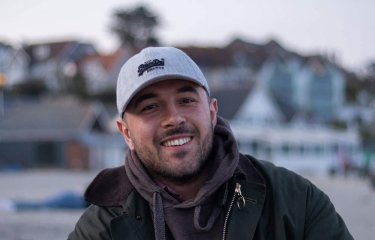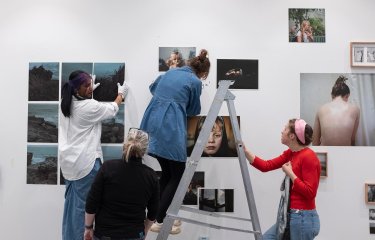Working in the film industry: in conversation with graduate Luzie Backhoff
14 July 2022

After completing her BA Television and MA Film & Television degrees at Falmouth University, graduate Luzie Backhoff has been making a name for herself at one of the biggest camera rental companies in Germany.
Luzie is a project manager at Ludwig Kameraverleih, working in tandem with producers from huge programmes such as Babylon Berlin, Tatort and How to Sell Drugs Online (Fast). Recently Luzie’s work has diversified, branching out to include work on music videos, advertisements and charitable productions.
Securing such an impressive role so quickly after graduation in a challenging industry is no mean feat. Luzie credits her success to the skills she learnt within the walls of Falmouth’s School of Film & Television.
We caught up with the Falmouth graduate to see what we could learn from her rapid rise in the film industry.
Can you tell us a bit about your job? What does a typical day look like for you?
Of course! I work for one of Germany’s biggest camera rentals, Ludwig Kameraverleih, which is part of The Rental group. We have eight facilities in Germany, as well as one in Warsaw.
As project manager, I’m the first person customers talk to when planning their next film in pre-production. I work with both the producers, as well as the directors of photography (DoPs) and their camera assistants.
The first projects I started working on were Babylon Berlin, Rabiye Kurnaz and Faking Hitler, as well as the third season of How to Sell Drugs Online (Fast) for Netflix. Since then, I’ve also been managing music videos for artists such as Lena Meyer Landrut, multiple advertisements and a production for Greenpeace.
Besides that, we manage a couple all-year-round productions, similar to the style of EastEnders or Holby City. And lest we forget the sheer amount of Tatort (THE German prime time crime drama on a Sunday night) productions, which vary all year round. Tatort is both a format and a series.
What’s the best thing about working in film?
The best thing is that everybody you meet and work with is dedicated to the craft. This leads to an instant connection, as you know you will go the distance to create the visual and audial experience that a film gives you.
Bringing stories to life, documenting important moments of history, showing justice and injustice and shaping the reality of everybody who sees our films – those are the best things about working in film!
I love going to work each day, because even a hard workday can be very rewarding. And you’ve probably forgotten half the struggles once you see the final product at the premiere. Just feeling the wonder of being fully immersed in a film and forgetting everything around you. Or learning something new, while watching a documentary. Can’t beat that!
Falmouth is well connected in the television landscape, and it was also thanks to my teachers, professors and tutors that I could gain so much industry experience while studying.
How did the skills you gained on your course help you in your working life?
Where should I start? One of the first courses we did in BA Television was researching, and thus cold calling. Oh, we were so intimidated by calling up industry veterans or big production companies. Now I don’t even blink when calling up ITV, Panavision, or any big German production company.
Communication skills are key and I’m grateful that we could learn language and technical skills, as well as set etiquette on the course! Falmouth is well connected in the television landscape, and it was also thanks to my teachers, professors and tutors that I could gain so much industry experience while studying. All these connections led to me finding work after graduating.
Another skill, maybe not as obvious to English students, is the English language. Thanks to the language courses I advanced so much quicker and managed to reach a C2 level, which classifies me as a native speaker. This was important for when I studied and worked in the UK. However, since returning to Germany I have made use of my English every single day! I gained a lot of international customers at work, simply by being able to communicate with them.
While my academic focus was an all-rounder (the topics were just too exciting), I focused on sound and producing during my BA and producing in my masters. A lot of these skills transfer to my current position, such as communication with different departments, long term production planning, technical knowledge, problem solving and learning different financial structures.
Hustle, network, work!
What tips can you give to students when it comes to landing your first job in film?
Try everything! Your university, especially your department, provides you with so many amazing opportunities. Don’t take them for granted. Hustle, network, work! I applied for every single industry opportunity our lecturers could get us. I went to every single guest lecture, as those contacts would grant me further work opportunities. Go to every networking event and film festival that you can find, and don’t be shy about introducing yourself!
Fill up your CV so much that you have to edit it down when you graduate (speaking from experience here). All of this will give you a network structure and loads of known faces, no matter where you apply.
For the international students: Note, that it can take up to 6 months to find a good position, so don’t be too hard on yourself if you don’t land your dream job right away. When you return, the hard work of creating a network that supports you will take a while. I found that having the big company names (e.g. the BBC, NBC Universal, Channel 4) on my CV would propel me along.






